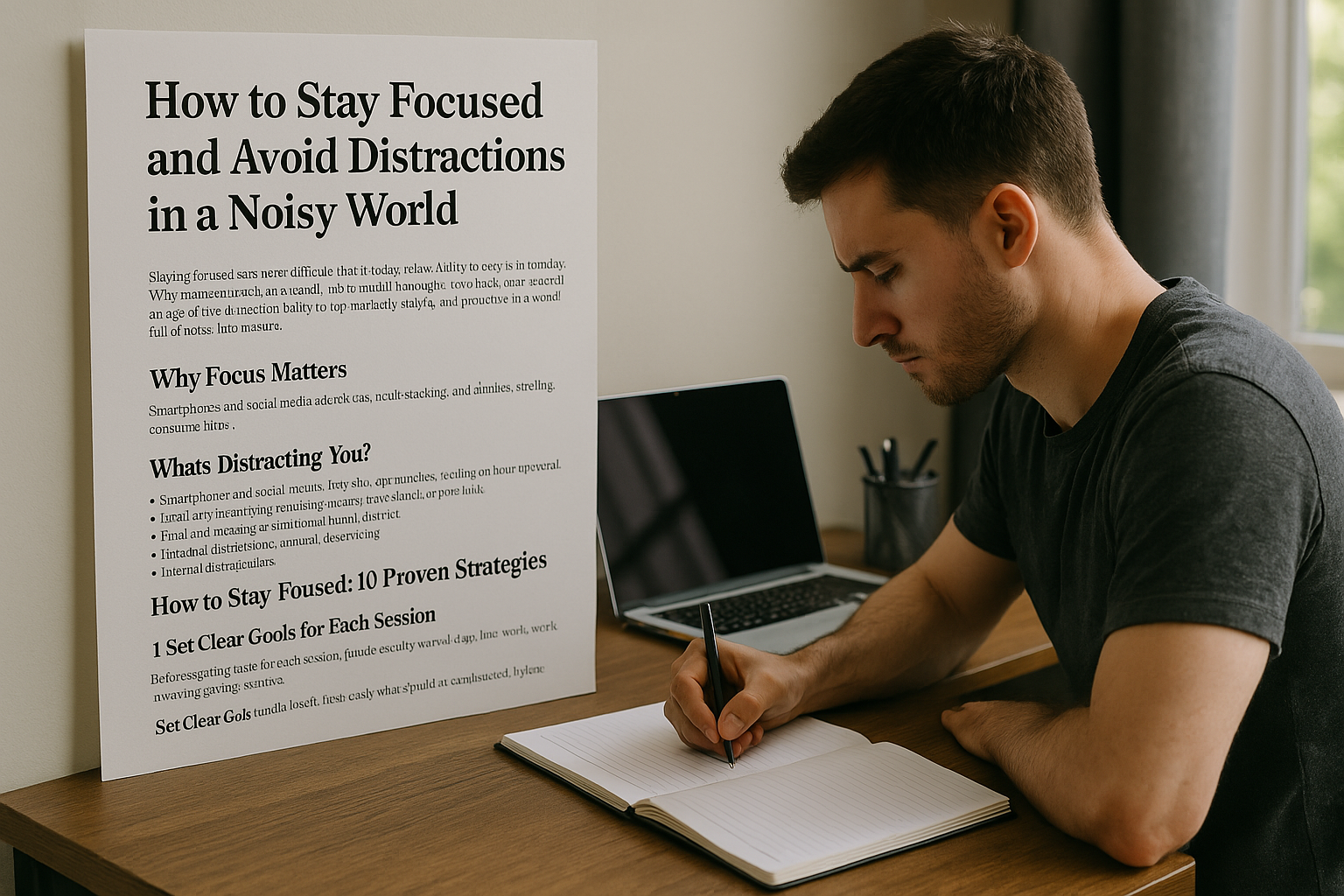Staying focused has never been more difficult than it is today. With constant notifications, endless social media feeds, and a never-ending stream of emails and messages, our attention is under attack. In an age of distraction, the ability to concentrate deeply on a task is not just valuable—it’s a superpower.
Whether you’re studying for an exam, working on a business goal, or simply trying to complete a daily task, focus is the key to doing your best work. In this article, you’ll learn why focus is essential, what’s stealing your attention, and practical strategies to help you stay sharp, present, and productive in a world full of noise.
Why Focus Matters
Focus allows you to engage in deep work—tasks that require creativity, problem-solving, and full attention. When you’re focused, you produce higher-quality results in less time. It improves memory and retention, as your brain can process information more effectively when it’s not multitasking. Strong focus also reduces stress because it allows you to complete tasks efficiently and avoid last-minute panic. Long-term, focus supports personal growth, learning, and achieving meaningful goals.
What’s Distracting You?
To improve focus, you need to know what’s stealing it. Common culprits include:
- Smartphones and social media: Notifications, apps, and mindless scrolling consume hours of your day.
- Multitasking: Switching between tasks reduces cognitive performance and increases errors.
- Email and messaging overload: Constant interruptions break concentration and prevent deep work.
- Environmental distractions: Noisy environments, cluttered spaces, or poor lighting affect attention.
- Internal distractions: Stress, anxiety, hunger, or even boredom can pull your mind away from what matters.
How to Stay Focused: 10 Proven Strategies
1. Set Clear Goals for Each Session
Before starting a task, decide exactly what you want to accomplish. Instead of “work on project,” define the goal as “write the introduction to the report.” Clarity directs your brain and reduces the chance of drifting.
2. Use the Pomodoro Technique
Work for 25 minutes, then take a 5-minute break. After four sessions, take a longer 15–30 minute break. This method improves stamina and prevents mental fatigue, making long tasks feel manageable.
3. Turn Off Notifications
Silence your phone and desktop alerts. Use “Do Not Disturb” mode or app blockers like Forest, Freedom, or Focus@Will. The fewer interruptions, the deeper your focus.
4. Create a Distraction-Free Workspace
Design a space that supports your concentration. Keep your desk clean, use noise-canceling headphones, and make sure your lighting is comfortable. A tidy environment helps clear mental clutter.
5. Batch Similar Tasks Together
Grouping tasks that require similar focus—like replying to emails or making phone calls—reduces mental switching and conserves brainpower. Choose time slots for specific task types instead of bouncing between them.
6. Practice Mindfulness and Meditation
Mindfulness trains your brain to stay in the present. Just five to ten minutes of daily meditation can improve attention span and reduce the urge to react to every distraction.
7. Fuel Your Brain Properly
Dehydration, hunger, and poor nutrition impair focus. Drink water, eat balanced meals, and consider brain-boosting foods like berries, nuts, and leafy greens.
8. Take Regular Breaks
Breaks prevent burnout. Step outside, stretch, or walk around the block. Movement and fresh air re-energize the brain and help maintain focus throughout the day.
9. Use Visual Reminders of Your Goals
Keep a note, vision board, or planner in sight that reminds you of your larger goal. When you feel distracted, this visual can bring your focus back to what matters.
10. Start with the Hardest Task First
Tackle your most demanding task when your energy is highest—usually in the morning. This builds momentum and makes the rest of the day feel more manageable.
Overcoming Internal Distractions
Sometimes, the biggest distractions are inside your own head. If you’re feeling anxious, try journaling for five minutes to clear your thoughts. If you’re bored, change your environment or work in short bursts. If you’re tired, rest or do a quick breathing exercise to reset.
It’s also important to let go of perfectionism. Sometimes, fear of doing something “wrong” can stop you from starting at all. Focus on progress over perfection.
Digital Detox Techniques
If screen time is draining your attention, try these digital detox strategies:
- Designate “phone-free” times, like your first hour in the morning or during meals.
- Use grayscale mode on your phone to make it less visually appealing.
- Remove social media apps from your home screen or uninstall them during focused workweeks.
- Log your screen time to become more aware of habits you can shift.
Building a Focus-Friendly Routine
Start your day with intention. Instead of checking your phone first thing, plan your priorities for the day. Schedule focused work in your peak mental hours. Add short breaks after deep work periods. In the evening, wind down with relaxing, non-digital activities to improve sleep and recharge for the next day.
The Benefits of a Focused Life
When you reclaim your focus, you’ll get more done in less time. You’ll feel less overwhelmed, more productive, and more in control of your day. Your work quality will improve, and so will your confidence. Beyond productivity, staying focused helps you be more present—with your family, your friends, and your own goals.
Start Improving Your Focus Today
Choose one focus strategy from this article and implement it this week. Whether it’s silencing notifications, organizing your workspace, or trying Pomodoro sessions—commit to one habit and build from there.
You don’t need to eliminate every distraction at once. But every moment of focus you reclaim is a step toward a more intentional, successful, and fulfilling life. Start now—and give your attention the value it deserves.
